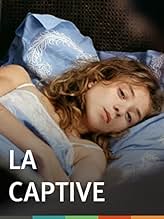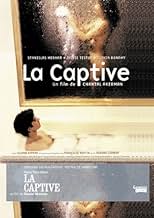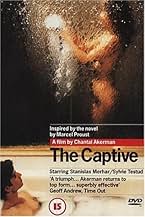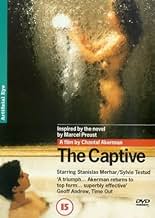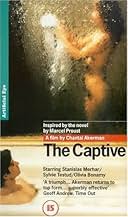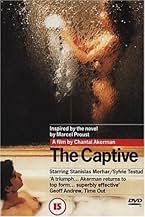La Captive
- 2000
- Tous publics
- 1h 58min
NOTE IMDb
6,0/10
2,3 k
MA NOTE
Une adaptation de La Prisonnière de Marcel Proust (cinquième tome d'À la recherche du temps perdu). Ce conte grave sur un amour tragique et dysfonctionnel se déroule à Paris, en France.Une adaptation de La Prisonnière de Marcel Proust (cinquième tome d'À la recherche du temps perdu). Ce conte grave sur un amour tragique et dysfonctionnel se déroule à Paris, en France.Une adaptation de La Prisonnière de Marcel Proust (cinquième tome d'À la recherche du temps perdu). Ce conte grave sur un amour tragique et dysfonctionnel se déroule à Paris, en France.
- Réalisation
- Scénario
- Casting principal
- Récompenses
- 3 nominations au total
Avis à la une
Modern day adaptation of a section of Proust's magnum opus that is true enough to the book in its theme and events and interestingly has the Marcel character still sunk in an archaic, aristocratic world.
KD Lang lookalike Stanislas Merhar does a good job doing the insulated, emotional (and physical) frailty, trapped in an adolescent infatuation of towering poetic naivety, all the while consumed with jealousy by the suspicion that his live-in girlfriend is an active lesbian behind his back.
It's slow. There's a lot of prowling around his creaking Paris apartment, lots of talking in cars - we seem to be taking entire journeys in real time. Akerman gave herself an easy directing job. The use of classical music is lazy - Schubert's Arpeggione Sonata is suitably Proustian, but Rachmaninov's Isle of the Dead is absurdly melodramatic, especially when played incongruously, Godard-fashion, over serene images.
Those familiar with the writer and director can easily pull back the gauze to reveal the real issues - an inverted couple struggling to maintain a hetero relationship - but that is so superficial it hardly seems worth special effort and the film works better with the ambiguity in place (as intended), with the implication that naivety (misunderstanding, confusion) is at the root of jealous passion. The Marcel character is so naïve that in the sex scenes he doesn't even know that he is supposed to put it in - doing the movements without getting undressed (he's in bed in his overcoat in one scene). That was strangely tragic, and although it may have been a stylisation to symbolise their failure to connect, it was easier to take it literally.
With liberties like that though, and done so earnestly, it's craves some indulgence. The worst problem is that the girl is comatose and unattractive, showing nothing of Albertine's sprightliness and guile that gave that character her painful duplicity. The ending too is a disappointment.
KD Lang lookalike Stanislas Merhar does a good job doing the insulated, emotional (and physical) frailty, trapped in an adolescent infatuation of towering poetic naivety, all the while consumed with jealousy by the suspicion that his live-in girlfriend is an active lesbian behind his back.
It's slow. There's a lot of prowling around his creaking Paris apartment, lots of talking in cars - we seem to be taking entire journeys in real time. Akerman gave herself an easy directing job. The use of classical music is lazy - Schubert's Arpeggione Sonata is suitably Proustian, but Rachmaninov's Isle of the Dead is absurdly melodramatic, especially when played incongruously, Godard-fashion, over serene images.
Those familiar with the writer and director can easily pull back the gauze to reveal the real issues - an inverted couple struggling to maintain a hetero relationship - but that is so superficial it hardly seems worth special effort and the film works better with the ambiguity in place (as intended), with the implication that naivety (misunderstanding, confusion) is at the root of jealous passion. The Marcel character is so naïve that in the sex scenes he doesn't even know that he is supposed to put it in - doing the movements without getting undressed (he's in bed in his overcoat in one scene). That was strangely tragic, and although it may have been a stylisation to symbolise their failure to connect, it was easier to take it literally.
With liberties like that though, and done so earnestly, it's craves some indulgence. The worst problem is that the girl is comatose and unattractive, showing nothing of Albertine's sprightliness and guile that gave that character her painful duplicity. The ending too is a disappointment.
This film gets only 5.9?! First, I love Proust, but you do not have to read this specific part of 'In Search of Lost Time' to appreciate this extraordinary story of obsession and the need of one lover to absorb another, and the other lover to need to keep both a distance and a mystery in the relationship.
Chantal Akerman was arguably one of France's greatest directors before she was tragically lost. She was focused in a way that makes most directors seem fuzzy, and her talent with both images and actors was unbeatable. That her images and pacing take their time demands attention from an audience like any work of art. She uses Rachmaninov's music 'Isle of the Dead' as a key motif in sound that puts other overlaid music in most films to shame. I am here to praise this film, but her work as a whole deserves perhaps more praise than it gets. Eric De Kuyper, a great writer who wrote the script with her, is also a filmmaker of importance. Eric De Kuyper, a great writer who wrote the script with her, is also a filmmaker of importance. Everything is in order in this film. Both lead actors are superb, especially Stanislas Merhar who is, in my opinion, a male Garbo among actors. Elusive, beautiful and always holding an essential mystery in his way of acting, he rivets the gaze of the viewer to the screen. There is nothing to fault in this film, and impatient viewers, which most reviewers are, should watch it more than once. It deserves more than the insulting 5.9 it has been given, but then this perhaps reflects the quality of the eyes and minds that receive it.
Chantal Akerman was arguably one of France's greatest directors before she was tragically lost. She was focused in a way that makes most directors seem fuzzy, and her talent with both images and actors was unbeatable. That her images and pacing take their time demands attention from an audience like any work of art. She uses Rachmaninov's music 'Isle of the Dead' as a key motif in sound that puts other overlaid music in most films to shame. I am here to praise this film, but her work as a whole deserves perhaps more praise than it gets. Eric De Kuyper, a great writer who wrote the script with her, is also a filmmaker of importance. Eric De Kuyper, a great writer who wrote the script with her, is also a filmmaker of importance. Everything is in order in this film. Both lead actors are superb, especially Stanislas Merhar who is, in my opinion, a male Garbo among actors. Elusive, beautiful and always holding an essential mystery in his way of acting, he rivets the gaze of the viewer to the screen. There is nothing to fault in this film, and impatient viewers, which most reviewers are, should watch it more than once. It deserves more than the insulting 5.9 it has been given, but then this perhaps reflects the quality of the eyes and minds that receive it.
A quiet, intense, low key look at the dysfunctional relationship between a very rich young man and the young woman he 'keeps' at his house. Is she trapped or is he? Who's really the captive?
Not much happens in terms of events, the film is mostly in the details, but those details are great. The two leads give amazingly subtle performances, and the photography and lighting – while never showy – are magnificent. One of the most interesting and effective 'cold' looks I've seen in a film. Beautiful compositions.
A film for those interested in complexity of character, a director using image and mood to tell a story, and patience to allow the slow accumulation of details to add up over time to something very special.
Not much happens in terms of events, the film is mostly in the details, but those details are great. The two leads give amazingly subtle performances, and the photography and lighting – while never showy – are magnificent. One of the most interesting and effective 'cold' looks I've seen in a film. Beautiful compositions.
A film for those interested in complexity of character, a director using image and mood to tell a story, and patience to allow the slow accumulation of details to add up over time to something very special.
You have to read Proust to appreciate this movie. I imagine it was the most awful, boring treachery to subject someone to if they hadn't read La Captive. Ackerman is actually quite witty in portraying the mental restlessness of the characters, especially Ariane/Albertine constantly being caught in her poorly planned deceptions). In addition to this her visual portrayal of Proust's themes of desire and dissatisfaction are very poignant(although sometimes uncomfortable). An example being the bathing scene, where Simon/Marcel is most vulnerable and unselfishly sensual (I say unselfishly because of the contrast of the other sensual scenes where Ariane is sleeping) but this is only possible for him because of the distance and physical barrier between them. Ackerman is not entirely successful at putting Proust's La Captive on film, but she does make a beautiful, simplified attempt.
At the start I found this film very slow and I think anyone would who did not appreciate its nature before watching it.
It's easy in this one to be put off with the almost entirely gloomy settings, however, they are part of the film and, as you begin to appreciate what the film is actually about, they make a lot more sense.
The film is not about a plot or a story, it is about the people in it. Nor does it tell you what it is about the people that you are meant to see. So this film is very much for the viewer who likes to watch, observe, think and conclude.
You basically get a very slow and moody perspective on a strange(?) boy girl relationship. The interaction between them is never really explained until right up till the end, so it's a case of watching and wondering what is going on between them.
Apparently uneventful, I found myself being slowly drawn into, seduced by, their romance, question being stacked on question till I did really feel a bit frustrated.
However, in the last 30-40 minutes this film suddenly becomes alive and you begin to understand what the point of it was. The point is very poignant and sad and would never have been put across had the earlier 3/4 of the film not been so 'uneventful'.
If you like poetry, you will probably like this film. It has you wondering and speculating right up to the last stanza when you then realise the point of what came before. It is a very sad but beautiful poem.
It's easy in this one to be put off with the almost entirely gloomy settings, however, they are part of the film and, as you begin to appreciate what the film is actually about, they make a lot more sense.
The film is not about a plot or a story, it is about the people in it. Nor does it tell you what it is about the people that you are meant to see. So this film is very much for the viewer who likes to watch, observe, think and conclude.
You basically get a very slow and moody perspective on a strange(?) boy girl relationship. The interaction between them is never really explained until right up till the end, so it's a case of watching and wondering what is going on between them.
Apparently uneventful, I found myself being slowly drawn into, seduced by, their romance, question being stacked on question till I did really feel a bit frustrated.
However, in the last 30-40 minutes this film suddenly becomes alive and you begin to understand what the point of it was. The point is very poignant and sad and would never have been put across had the earlier 3/4 of the film not been so 'uneventful'.
If you like poetry, you will probably like this film. It has you wondering and speculating right up to the last stanza when you then realise the point of what came before. It is a very sad but beautiful poem.
Le saviez-vous
- AnecdotesChosen by "Les Cahiers du cinéma" (France) as one of the 10 best pictures of 2000 (#02).
- ConnexionsFeatured in Women Make Film: A New Road Movie Through Cinema (2018)
- Bandes originalesL'ILE DES MORTS, Op 29
Music by Sergei Rachmaninoff
Performed by Koninklijk Concertgebouworkest (as Royal Concertgebouw Orchestra)
Conducted by Vladimir Ashkenazy
© 1909 by HAWKINS & SON (London) LTD
(p) 1984 DECCA RECORDS COMPANY LTD
Avec l'aimable autorisation de UNIVERSAL MUSIC PROJETS SPECIAUX
Meilleurs choix
Connectez-vous pour évaluer et suivre la liste de favoris afin de recevoir des recommandations personnalisées
- How long is The Captive?Alimenté par Alexa
Détails
- Date de sortie
- Pays d’origine
- Langue
- Aussi connu sous le nom de
- The Captive
- Lieux de tournage
- Paris, France(setting of the whole action)
- Sociétés de production
- Voir plus de crédits d'entreprise sur IMDbPro
Box-office
- Montant brut mondial
- 636 $US
- Durée1 heure 58 minutes
- Couleur
- Mixage
- Rapport de forme
- 1.85 : 1
Contribuer à cette page
Suggérer une modification ou ajouter du contenu manquant

Lacune principale
By what name was La Captive (2000) officially released in Canada in English?
Répondre
